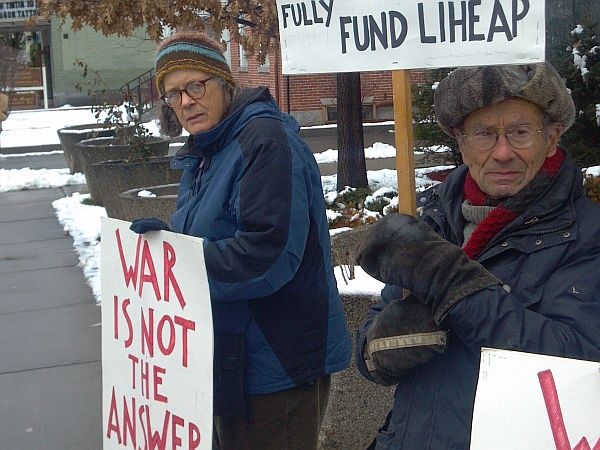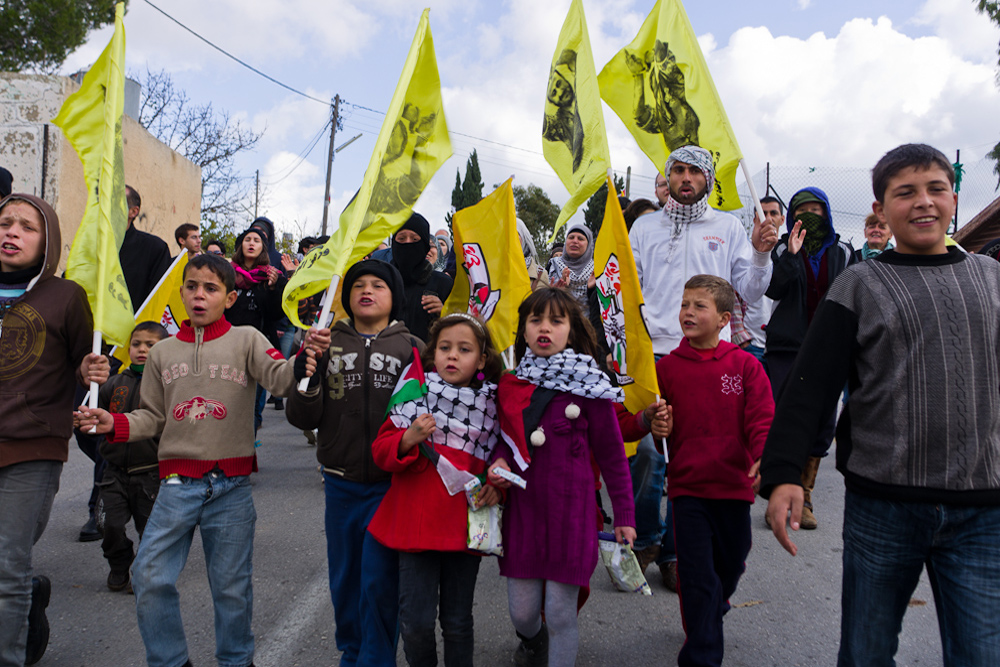
VPR/John Dillon
Helen and Jules Rabin have occupied this sidewalk weekly in Montpelier in vigil for the Iraq War. They say they will hang up their signs at the end of the year.
But as VPR's John Dillon reports, other activists say they'll continue to stage demonstrations until all U.S. soldiers come home from Afghanistan and other conflicts.
(Dillon) For nine years, veteran peace activists Jules and Helen Rabin have held a midday Friday vigil in front of the Montpelier post office.
They usually arrive around noon, unpack their signs, and stand with a half-dozen others as the lunchtime crowd streams by. A few offer silent nods, others look away or say some harsh words. And some, like Anne Sarcka, give a hug of gratitude as they walk past.
(Sarcka) "You are something else. Thank you for being out here all these years."
(Dillon) Jules Rabin is 87, a short, spry man with an expressive face and a ready smile. Before he hoists his sign, he stuffs disposable hand warmers inside his large leather gloves.
(Rabin) "I chill easily. And we've gone through a couple of boxes, big boxes of these."
(Dillon) Rabin says he feels the wind and chill more these days, so with the withdrawal of U-S troops from Iraq he's ending this form of outdoor activism.
(Rabin) "We've been doing this for nine years. And Helen and I been here just - with a few exceptions - just about every week for nine years. But we're getting cold and we're getting tired."
(Dillon) Rabin is a baker, well known for his sourdough bread, a former college professor, and a life-long peace activist. He protested the Vietnam War and in the early 1960s, Rabin took part in an 8,000 mile disarmament march across North America and Europe.
He says his Montpelier vigil is just one small part of a movement this year that has swept from Arab capitals to Wall Street.
(Rabin) "People are learning that it's not enough to vote every two or four years. You vote with your feet and you vote with a sign you make yourself when the spirit moves you. Something terrible is happening in the country then you express yourself. And that's a citizens vote, too."
(Dillon) Rabin has a new sign today. It says: "One war is over, now use defense spending to keep people warm."
It refers to federal cuts to a program that helps low income people heat their homes.
Helen Rabin says one goal of their weekly vigil was simply to remind the public what their government was doing around the world.
(Helen Rabin) "I feel like the destruction of Iraq, the social fabric of Iraq hasn't been in the forefront of people minds. And we were concerned about that. It's been mainly that, it's not like we feel like we could stop the war. It's just to keep the issue in front of people".
(Dillon) While the Rabins plan to hang up their signs others will maintain the weekly vigil.
Dave Connor is associate pastor at the Old Meeting House in East Montpelier.
(Connor) "We're happy that the war is officially ended in Iraq but we should probably be paying reparations right way for what we've done and left in Iraq behind us. We want to bring the troops home from Afghanistan. We support the troops in every way but we think the safest and best place for them is outside of Afghanistanand back home doing National Guard work in this country."
(Dillon) Connor says the Rabins are an inspiration for their enduring dedication to promoting peace.


















